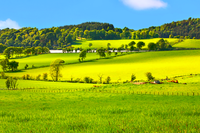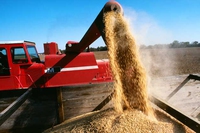
Scotland wants to protect its environment: it says no to GMOs
The country part of the United Kingdom has decided to ban the cultivation of genetically modified crops in order to protect its environmental heritage.
The country part of the United Kingdom has decided to ban the cultivation of genetically modified crops in order to protect its environmental heritage.
Producing healthy food by working in harmony with the environment is possible. Greenpeace says how to do it in the report “Ecological Farming: the seven principles of a food system that has people at its heart”.
According to a WWF report, the average European citizen eats 61 kg of soy yearly, 93 percent of which is hidden as animal feed in meat, fish, eggs and dairy products.
Industrial cattle farming is carried out with a clear commercial purpose: the production of the largest amount of meat possible. Here are some risks this farming method brings about.
A political, social, and ecological album: The Monsanto Years will be released on 16 June, but the album’s title talks turkey. Neil Young has always been on the front line to raise fans’ awareness on environmental and sustainable farming issues and, after having taken a stand against large oil companies in Canada, he now rails
Alongside the publication on the EU Official Journal of the EU Directive (2015/412) regarding the possibility for the Member States to restrict or prohibit the cultivation of genetically modified organisms (GMOs) in their territory, a survey carried out by Coldiretti (National Small Farmers’ Confederation) shows that lands sown with biotech seeds decreased by 3% in
The Russian government submitted to the Parliament a bill to prohibit the cultivation and rearing of genetically modified plants and animals within the Russian Federation territory, with the exception of scientific research purposes. The new legislation envisages the possibility of the government to prohibit foreign imports of genetically modified products, after having tested the effects
During the coldest days of the year here are a few tips on how to make bird feeders that help birds survive the winter.
1 Apples Apples are one of the food products to be treated the most with pesticides, resulting in chemical residues on the peel. 40 different pesticides have been identified. A Swiss study, published in the proceedings of the 25th International Horticultural Congress, found in organic apples a higher content of potassium (+31%) and phenols (+19%, mostly
Global GMO cultivation. The majority of genetically modified species cultivated on a global level are soy, maize, cotton and rapeseed. They account for 176 million hectares globally, according Manuela Giovannetti, professor at the Department of Agricultural, Food and Agro-environment Sciences of the University of Pisa. These species are used for manufacturing and for the production








